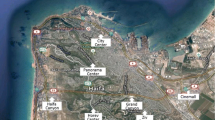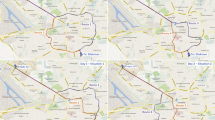Abstract
A psychological scaling technique, magnitude estimation, is used to rate time spent on various elements of bus transit trips. Relative values of time are found for in-vehicle portions of trips, walking, waiting and transferring. Because magnitude estimation produces a ratio scale, results can be directly incorporated into modal choice analyses, route planning and evaluation procedures where monetary values of time are not necessarily required.
Similar content being viewed by others
References
Algers, Staffan, Hansen, Stein and Tegner, Goran (1975). “Role of waiting time, comfort and convenience in modal choice for work trip,” Transportation Research Record 534: 38–51.
DeSerpa, Allan C. (1973). “Microeconomic theory and the valuation of travel time: some clarification,” Regional and Urban Economics 2: 401–410.
Dobson, Ricardo (1977). “Data collection and analysis techniques for behavioral transportation planning,” Traffic Quarterly 21: 77–96.
Horowitz, Alan J. (1978). “The subjective value of the time spent in travel,” Transportation Research 12: 385–393.
Krantz, David H. (1972). “A theory of magnitude estimation and cross-modality matching,” Journal of Mathematical Psychology 9: 168–199.
Pulliam, Robert, Pain, Richard F., Shaffer, Margaret T. and D'Ignazio, Janet Letts (1976). “Survey to assess public perception of values critical to transportation planning,” Transportation Research Record 617: 13–18.
Searle, S. R. (1971). Linear Models. New York: John Wiley.
Shinn, Allen M. (1972). Toward a Policy Oriented Urban Transportation Demand Model: A Psychometric Approach to Modal Split. Washington, DC.: Division of Social Systems and Human Resources, National Science Foundation.
Stevens, S. S. (1966). “On the operation known as judgement,” American Scientist 54: 385–401.
Stopher, Peter R. (1976). “Derivation of values of time from travel demand models,” Transportation Research Record 587: 12–18.
Train, Kenneth (1976). Work Trip Mode Split Models: An Empirical Exploration of Estimate Sensitivity to Model and Data Specification. Working Paper No. 7602, Institute of Transportation Studies, University of California, Berkeley.
Wachs, Martin (1976). “Consumer attitudes toward transit service: an interpretive review,” Journal of the American Institute of Planners 42: 96–104.
Watson, Peter L. (1974). The Value of Time; Behavioral Models of Modal Choice. Lexington: Lexington Books.
Author information
Authors and Affiliations
Rights and permissions
About this article
Cite this article
Horowitz, A.J. Subjective value of time in bus transit travel. Transportation 10, 149–164 (1981). https://doi.org/10.1007/BF00165263
Issue Date:
DOI: https://doi.org/10.1007/BF00165263




